- HOME
- ABOUT
- PERSONAL STORIES
- CAJUN
- LAS FLORES
- MIGHTY ONE
- WHARF RAT
- YALE STREET ICE HOUSE
- CAPTAIN CHAS. NOBLE
- A MIKI-MIKI TUG
- TAR-BABY
- NORTH ATLANTIC CONVOY
- OPERATION MULBERRY
- PEASOUP ON A POTATO PATCH
- S.S. CANBERRA’S FINEST HOUR
- ISCHIA
- THE F BOATS
- OCEAN LIGHTER
- ZAMBOANGA MONKEY CAPER
- TURMOIL ON TAWI-TAWI
- PIER-HEAD JUMP
- REQUIEM FOR A FRIEND
- FITCH THE BITCH
- WATER TAXI
- TALL TALES
- GALLERY
- GRATITUDE
- CONTACT
WHARF RAT
Ron Stahl
I’m 90-plus years now; I have many good memories of my youth…but there is one indelible growing-up period that often comes to mind. ‘Under the Santa Monica Pier’ is one of those fond memories.
My family’s main residence was up on ol’ lady Rindge’s beach at Las Flores, just South of Malibu. We also had an apartment in Santa Monica to use when we rented out the beach house, oft times for a week or longer.
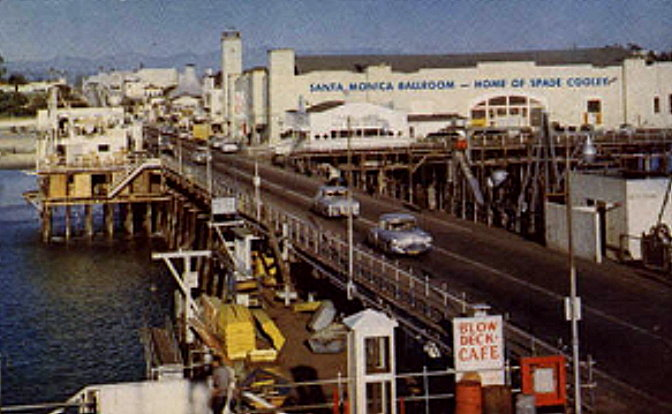
I was about 14 or 15 when I was hired as a beach-boy on weekends at the Santa Monice Beach Club at the foot of Santa Monica Canyon. My job was to put out the member’s beach chairs and umbrellas and with my own sand-sifter (that I made at home) sift the sand in neat patterns. Plus, I did all the ‘fetch-n-git’ routines. I was offered tips but most times members would order a coke or sandwich for me, putting them on their club tab.
One of the members, who was also a member of the Santa Monica Yacht Club, kept his large schooner, ‘Siesta’, anchored behind the breakwater off the pier.
He said that the club could use a part-time attendant for its ‘clinker’ fleet, which was stored on a landing under the pier, and he thought I could handle the job. He also mentioned that if I could handle a skiff to row owners and passengers to their yachts, there could be extra money.
After finishing up one weekend at the Beach Club, I could hardly wait to get to the security office on the pier on Monday morning as I was instructed. I filled out an application with my name and address and was given a small button with a number on it and told I must wear it when on the pier.
The guard led me to the yacht club’s lower level landing, showed me how to start the air-compressor and then attach the slings to one of the fleet of eight ten-foot ‘Puffin’ clinker sailing dinghies, (known for their overlapping plank or lapstrake construction). They were stacked two high; the lower boat was on chocks and rollers and slid under the top one. He had me operate the air-hoist while pushing the boat out over the water.
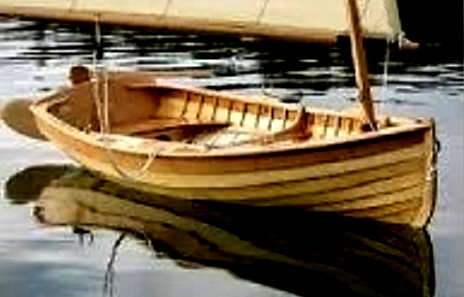
The boat owner would usually go down the ladder to get in and install the mast and rudder. He told me that the man who had the job, got sick and quit and that the Hawaiian Paddleboard Club also used part of the space and stored their surf-boards on edge in vertical racks.
The other part of the job responsibility was that on weekends I was to ferry owners, guests and crews to their yachts. I would need to launch a skiff, go down the ladder, climb aboard, row to the floating public dock further out on the pier, take aboard one to two people and row them out to their boats. In a way, it was fun and it did have its perks. I was paid thirty-five cents an hour and on occasion received a tip. I met a lot of interesting people and was often invited aboard the yachts.
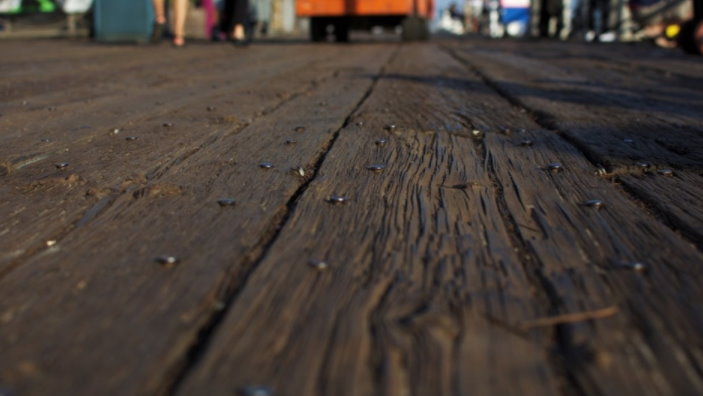
The summer months were not a problem as long we lived in town but come the Fall my work schedule was hit-n-miss. I had to ride the school bus 13 miles to school; my after-school activities were limited. The weather, my mother’s schedule, all had a bearing on what I wanted to do. For this short period of my life ‘the pier’ and all its environs, was my main interest. If I had
two or three hours to kill, I was at the pier, sometimes working my butt off for no pay. Example; one day I was strolling out to the end when an employee I knew yelled for me to come and help him. He told me to pick up a gadget that resembled a miner’s pick and hold it on-top of the head of a large spike driven into the pier’s road planks as he slammed it with his heavy sledge hammer, re-bedding the spike. This went on for three days. I made maybe three dollars.
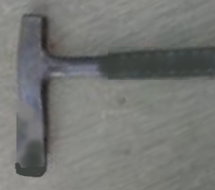
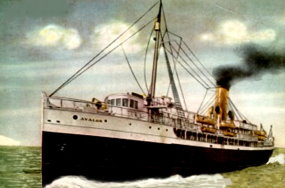
I remember S.S. Avalon’s inaugural cruise to Santa Monica’s Pier. Her normal run was from Wilmington to Avalon on Catalina Island, alternatively with the S.S. Catalina. Plans were to make Santa Monica a regular stop to pick up passengers to Catalina. It was a bit windy and there was a heavy swell. When the ship approached the end of the pier she was broadsided with an enormous swell. She
took a mighty roll, tearing up handrails and stanchions on the starboard side before she could back away; stranding several hundred disappointed passengers.
A job that probably had a great deal of influence on my sea-going future, was aboard the Marianna III. She was a fifty-five-foot Bait or Jig-boat, owned by an Italian fisherman who was some kin or buddy of my very good friend who operated the fish market and smoke house at the ‘Las Flores Inn’ (a place with a huge story all its own).
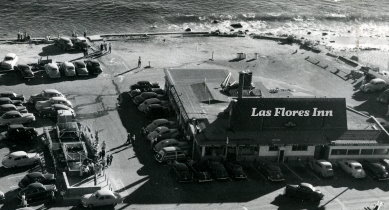
One morning when I rowed the Captain out to his boat he asked if I might be interested in doing some work for him very early in the mornings, indicating it was dirty, stinky and slimy and the pay was based on shares. He asked me to come aboard and he’d show me what I would have to do.
Midship forward of the hold was a fifty-five-gallon drum standing on its ends, a heavy plank with a heavy plank with a large meat-grinder was sitting on top. The Captain grabbed a fish-gaff off the bulkhead then, looking in the hold, he flipped the gunnysack covering back exposing mackerel and sardines bedded in crushed ice. He hooked a fish and stuffed it into the top of the grinder and started cranking. He smiled, “That’s all there is to it.”
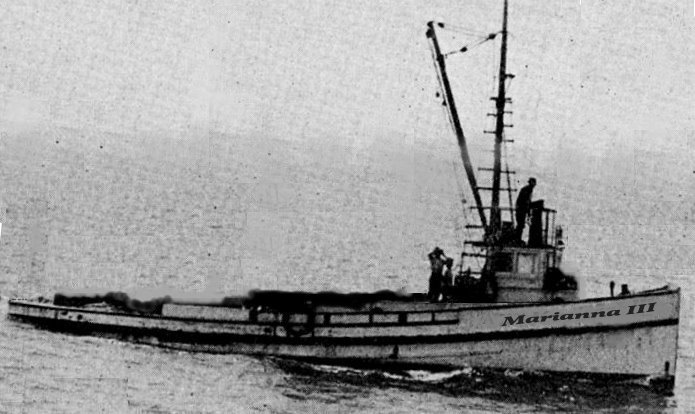
“What happens next?” I asked.
“You fill the drum and we’ll use the ground up bait as chum when we start fishing. You can start grinding any-time after midnight. It shouldn’t take more than two hours to grind. We load-up with ice at our landing, then take off from there around 4 am. You’re welcome to sail with us if you think you could handle it.”
I rode my bicycle home and told my mother that I had been invited to go on a cruise to Catalina and that I had to be aboard by midnight. She was aware of my job at the beach club and at the pier. My mother and step-father, were friends with the family that owned the yacht, ‘Siesta’. They had rented our house on the beach and sometimes stayed in touch with my mother. If she thought I was going with them, w ho was I to disillusion her?
I went to the pier at 9 pm and stored my bike down with the clinkers and as I walked to the end of the pier I noticed the lights on around the small building at the top of the boarding ramp with the Marianna tied up alongside the pier. I called out to the Captain as he was shoveling crushed ice into the topside fish bins, “Do you need any help?”
“Hi Ron. Come on aboard, we can get a head start. We came back from catching bait early. The live bait schooled up good enough to catch what we needed to fill the floating live bait pens. The crew went home and should be back in a couple of hours. We’ll be shorthanded, so it’s a good thing you’re coming along. I’ll go over a few do’s and don’ts with you.”
I climbed aboard, he motioned for me to follow, pointing to several items on the deck. “When those racks are flipped over the side and the Jack-poles are out you stay behind that screen over there so you don’t get a hook in your hide. When the men call for bait, grab the ladle, scoop the chum and toss it over each side of the boat. Sometimes the Tuna will go into a feeding frenzy, that’s when we land the most fish.”
Going to the grinder he scooped up a shovel full of mackerel and sardines from the bin and started feeding them to the grinder as I cranked. “Think you can handle it? Oh, by the way I have a secret little trick I use, don’t tell anyone. See that ball of tinfoil? I cut it up into about half-inch squares and mix them in with the chum. When we play the flood-lights over the side they glitter and attract the fish. Try to understand…we’re not fishing for a cannery like the big commercial boats. They go out for a week or so…we’re market fishers, we’re out for the night. We might load up with five to seven tons of mixed species, or whatever the customer’s requests, be it Tuna, Halibut or Yellowtail…we catch them all.
‘Tuti’ was what everyone called the skipper. I asked him why ‘Tooty’. Was it because he farted? He roared out laughing “No kid it’s an old Italian nickname for someone who is large.” He continued chuckling, shaking his head. He was about thirty-five, tall and husky, maybe six feet plus, and over 200 pounds; a little bossy but good natured. I liked him.
He opened a hatch exposing a spacious hold with bin boards dividing off several sections holding tubs of crushed ice which the crew had shoveled down the chute from his ice truck on the pier. We went forward to the wheelhouse and down a ladder to the fo’c’sle (crews’ quarters). There were two long settees with two pipe-framed bunks slung-up and a large box like compartment towards the aft part of the fo’c’sle, now open, exposing a large noisy engine slowly running.
My first introduction to an Italian sailor’s cup of coffee was horrible; no cream, no sugar and it was the blackest, strongest I’ve ever tasted. I thought it might have been left over for a couple of days. Tuti saw my reaction. “What’s the matter, you don’t like good espresso? I just brewed it. That’s a real man’s drink.”
The skipper stayed busy as I began grinding chum. I put in a large mackerel and felt the crunch of bones being crushed, a totally new experience for me. There was no filter, strainer or cap where the fish-parts came out, just assorted, bloody, messy chunks. Tuti handed me a yellow oilskin type apron. “Put this on or you’ll be drenched with blood and guts.” He dumped a bucket over the side with a lanyard tied to it, brought it back up, filled with water. “Here, you can rinse off in this.”
The crew started reporting aboard; only three came for tonight’s trip., One of the regulars couldn’t get off watch in time. I questioned what he meant ‘off watch’ “They were called to a warehouse fire, he’s a fireman like the rest of us,” one of the men responded.
The crew closed the hatches, then went to the fo’c’sle to close the engine room compartment, while Tuti climbed the ladder to the office on the dock and turned off the lights. On his return he announced, “Let’s get under way. Take in all lines.”
Everyone gathered in the wheelhouse to plan for this morning’s run. Tuti went over the routine, “We’ll deliver ice to barge number one, then go to barge number two (public fishing barges anchored a mile or two offshore). After that we’ll run out towards Santa Barbra island and maybe swing by Point Dume on our way in. Any questions? If not, you guys turn in and get some sleep. OK?”
A half hour later we hailed the first barge, ‘Rex’, once a ritzy gambling ship…now a fishing barge. As we came alongside they were already lowering the hook to winch up the 150 pounds of ice from our heavy canvas ice-bag; enough to last them over the weekend.
I caught the bag as they lowered it. I was surprised to find three nice size Halibut six-to-fifteen pounds each, five six-to-eight-pound Sea Bass and an assortment of smaller sized table fish, Perches, Calicos, Sand Dabs and so on. Tuti inspected, squeezed and smelled each fish. When he was through he wrapped several 10 dollar bills in a cloth sack and tied the sack to the hook and off it went.
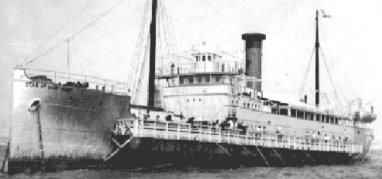
Turning to me, he looked directly in my face. “You didn’t see a thing.”
On the run to the second barge, ‘Texas’, once a proud World War One British patrol ship, Tuti told me to take the wheel and hold the course showing on the
compass. I was turning the wheel but the compass was not correcting as I thought it should. Tuti saw my frustration, took over the wheel and sternly remarked, “Look at that light on the barge”. He slowly brought the bow around heading for the light…now look at the compass…that number you see in the compass is your course…aim the bow to your destination…look and remember the course in case that light goes out or a fog rolls in and blinds you.”
Few times in my life, have I been chastised as Tuti just had. Normally I would react with resentment if my mother, stepfather, school-teachers or the Sisters at church would pick at me. Maybe it was the way he explained and demonstrated, not giving me the time to ponder a reaction.
We went through the same routine as with the first barge. We unloaded the ice and a water-bag of live Anchovies along with a canvas bag of Sardines for their fishermen’s bait. In return, we took aboard maybe 200 pounds of market fish.
We were heading North towards Point Dume, maybe ten miles away, when Tuti slowed the engine and started circling around very slowly, then he pulled the chord to the air-horn. I’ve heard it before but always from a distance, this time the blast was at the cabin top and spooked me.
The three men came topside, putting on their waders. They flipped the racks over the side and grabbed a pole. Tuti yelled for me to start tossing the chum over the side. I guess I wasn’t doing it fast enough. He kept yelling “faster…faster”. He hung the flood light over the side and that’s when I saw the school of fish. They were bunched up so tight I swear I could have walked on them.
The men with their Jack-poles were hooking and landing as fast as they slapped the water again with their large shiny barbless hook lures. I was scooping and tossing the chum as fast as I could. Tuti told me to steer the boat so he could flip a rack over the side and join the others landing the twenty to thirty-pound Yellowfin Tuna.
As fast as it started it stopped. Thirty minutes of intense action. A couple hundred fish, many still full of life, flip-flopping everywhere.
The racks were flipped back aboard and jack-poles put away. The Tuna was passed down and tossed into the bins and covered with ice. The topsides were scrubbed and rinsed.
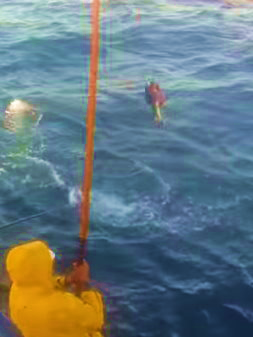
Everyone was in good spirits after a successful and profitable night’s catch. I even got a few pats on my back for chumming and handling the boat. Tuti announced. “Here’s to the best Master baiter ever!” The crew all roared in laughter. I really didn’t understand at the moment what he meant, but I took it as a compliment. After all was done, the crew went below to the fo’c’sle.
On our way in Tuti, started gutting and trimming the smaller market catch, tossing their entrails over the side, much to the delight of the following swarm of sea gulls.
I never did understand what a share meant. I was paid $5 for the night. I heard that the three men were each paid close to $20 cash.
I made three trips on the Marianna and I occasionally helped Tuti do maintenance work while the boat was secured at the buoy…UNTIL…
Southern California suffered what was called a Hurricane. I was on my way to school on the bus and saw the storm’s damage everywhere. The high seas and wind drove trash and debris clear up on the highway and appeared to damage several homes. When the bus stopped at Santa Monica Canyon, I jumped off and walked to the Beach Club. I stopped at the office inquiring if there was any damage. The manager asked if I would help the staff clean up the beach. There was scrap wood and trash everywhere; we had to physically hand carry all the stuff to a large pile by the Pacific Coast Highway.
I noticed a gathering of people on the beach in front of the Marion Davies house. As I approached I saw a section of a boat with assorted gear strewn about. I thought I recognized the small portion of the bow section and mentioned to the group, “Oh my gosh…that’s the Marianna III…I crew on her.”
A uniformed officer, I took to be either Navy or Coast Guard, started asking me a lot of questions regarding the debris; name of the boat, the owner, etc. He seemed to concentrate on the engine, now halfway buried in the sand. I recognized him as Arthur Lake, the actor who played Dagwood Bumstead in the movies. When finished, I hurried to the pier to talk to Tuti. He had showed up earlier but was gone by the time I got there. I went to the Security Office and told of my meeting with Arthur Lake regarding the wreck of the Marianna in front of the Davies house. The Sergeants response, “Of course he’s interested in the wreck, it happened in front of the house where he lives, he married into the family.”
I don’t know if the storm was responsible for the quick build-up of sand on the north-side of the pier. I used to be able to dive off the Yacht Club’s landing. Now at low tide there wasn’t enough water to launch the ‘Puffins’. The Yacht Club was trying to move further out on the pier, everything was in limbo and I needed to find a new source for earning money.
I heard that the Dome Bowling Alley on Ocean Park pier was looking for pin setters, part-time; the pay was six or seven cents a line. I found out I could jump over the lane separator, thus handling two lanes at the same time for twice the pay. But, we had to watch out for the drunks that tried to double-ball us.
I found another job as an employee for the pier company. My first assignment was as a boat operator on the ‘Chute the Chute’s’ at the end of the pier. I would load the boat up with six to eight passengers, pole the boat to the lifting ramp, engage the pin at the stern and off we’d go rising ever so slow. At the top was a turntable, we slowly spun round facing nothing but the sky above us, the table tilted down and we started sliding like on a toboggan, hitting the
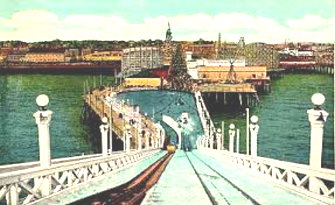
water at the bottom of the ramp with a monstrous splash. Everyone loved it.
If we weren’t too busy, I found that I could control the boat by shifting my weight to the left side, bypass the unloading lane and then have to pole the boat back to the loading dock. The passengers loved it but my boss kept threatening to fire me…but never did.
Another fun job: I heard that the new Casino Gardens Ballroom needed ticket takers for the ‘Dime-a-Dance’ turnstiles from 5 pm to 8 pm, then after that us ticket takers could get in for free for the evening ‘big band’ performances.
About this period in my life I suffered a major injury. A stupid experiment on my part with gun powder, taking near a year to heal, then followed with a broken arm at a “Samohi” football practice.
On the morning of December 7, 1941, I was laying on the beach in front of our house with my Zenith wide-band portable radio, when a news alert came on announcing that the Japanese were bombing Pearl Harbor in Hawaii. I rushed up to tell my folks, who were still asleep (my step-father worked nights). They told me to go away, that it was probably just a program like the Orson Wells, 1938 broadcast ‘War of the worlds’.